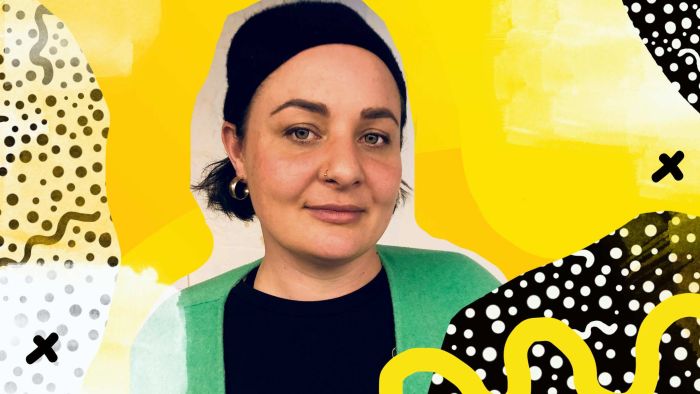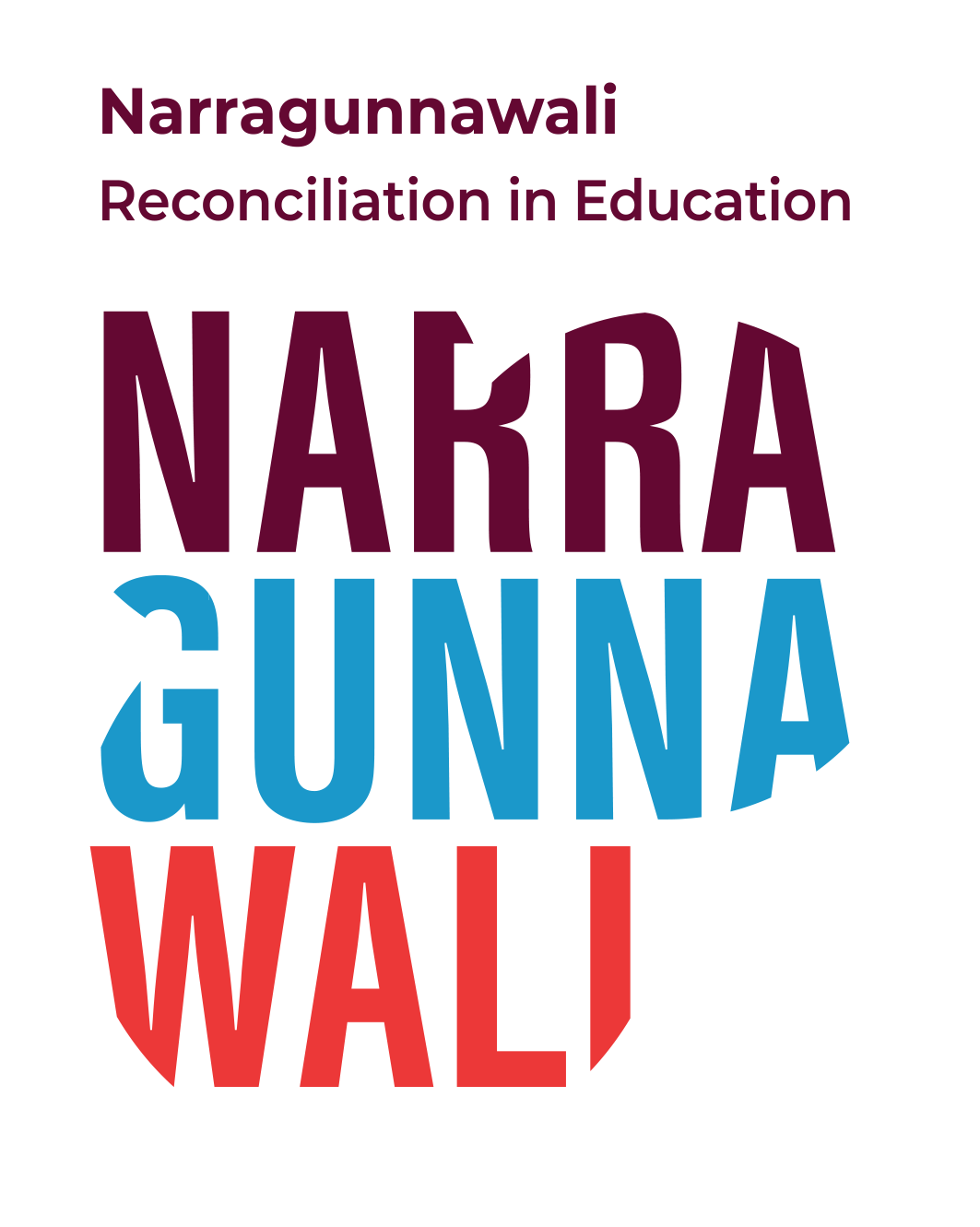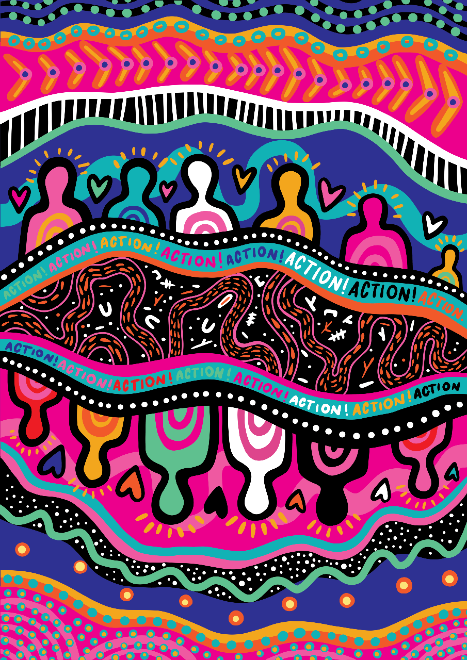Teacher Feature – Jessica Johnson, Nungala Creative

MEET THE ARTIST BEHIND THE NATIONAL RECONCILIATION WEEK 2021 ARTWORK
By Zoe Cassim
Reconciliation Australia’s Zoe Cassim caught up with the very humble and very talented Jessica Johnson—the artist behind Reconciliation Australia’s NRW 2021 poster Action—to talk all things art, society, and why the next generation are leading the way for present day positive change in the reconciliation space.
Teachers and educators come from all areas of our lives. As an Aboriginal woman myself, I learned just as much from the stories told in art, as much as from the artists and educators who created them.
One such artist is Jess Johnson, a descendent of the Warumungu/Wombaya people north of Tennant Creek.
Born on Larrakia Country, Jess spent her formative years among the diverse community of Canberra on Ngambri/Ngunnawal Country. Now residing in Sydney, Gadigal Country, Jess is an established designer, artist and owner of Nungala Creative.
As an artist, Jess works across mediums and methodologies. Renowned for her experimental aesthetic, she uses her work to address issues of injustice and celebrate culture and people through her recognisably bright positive aesthetic.
"There’s an obvious appeal to bright vibrant colours and positivity", she explains, "but for me it often comes from a challenging place of addressing the harsh realities of being Aboriginal in a largely racist society who deny us our belonging, authority and struggle. Much of my work has developed organically as a therapeutic response to managing and combating the external and sometimes internalised stigmas and experiences."
Attributing much of her creative practice to her late father who was a contemporary Aboriginal artist and a political activist in his own right, Jess belongs to an extended creative family who use art through all aspects of life, much of which is healing.
The NRW 2021 artwork reflects our connection and mutual obligation to one another, community and Country. Through commonality and difference, and the ability to come together and achieve real change.
Aboriginal and Torres Strait Islander peoples have been listening to the heartbeat of the Land and sea for generations. With their rainbow shaped souls the spirits ask for us to join and make reconciliation more than a word and to take action. We need to love one another and every aspect of the existing environment and community—we all have a role to play.
We are the change.
When speaking with Jess, there was an obvious awareness built from personal experiences, of the struggles many individuals face when looking to make, or be part of positive change around reconciliation.
“Nungala Creative socials have led people to reach out for various reasons, a common one is expressing their frustrations at having to attend university being taught anything about the true histories of Aboriginal and Torres Strait Islander peoples,” she said.
“It’s really important that teachers are supported by principals and leaders in schools and early learning services to really change the narrative of this country. The reality is most savvy kids are learning the truth online and through social media these days anyway, the good the bad and the ugly.”
“So much of what we have today has been built on the backs of Aboriginal and Torres Strait Islander men and women, and what is so baffling about it is that it’s genuinely not common knowledge. This is stuff that people should know about in schools — that people like David Unaipon existed, and were instrumental in building the foundations of what we have.”
Reflecting together on our own educations growing up, it was obvious that while we have indeed moved forward in the education systems, there are still large areas of growth that need to happen at an institutional level.
We agreed it will take everyone in order to move from tokenistic inclusion of resources, to hard-hitting truths and content that is often shied away from.
“It is a struggle to shift institutions and their preconceived nature towards Aboriginal and Torres Strait Islander peoples,” she said.
“So that struggle needs to be acknowledged when people are wanting to make positive change or to be a part of it.”
“The best thing about the Narragunnawali resources is that the information and resources are there, and if people want to learn, then it’s available,” she said.
“People can take ownership over their own education in this space and to use them how they see fit. The onus is on others to catch up, walk with us and to do the work themselves.”
And it is this onus that Jess and I agreed, seems to be deeply felt by the younger generations and their evolving understanding of what is right and what is wrong.
“Young people these days give me hope. They’re really staunch and informed. A non-Indigenous colleague of mine came to her first protest recently, Black Lives Matter because her young one made them attend. They were all scared for their safely but acknowledged that feeling as a insight into the lived experience of blakfullas.” Jess said.
“They are coming into these conversations with more open eyes and schooling their parents.”
Using her creativity and designs in Nungala Creative, Jess has helped many feel that little bit more empowered and comfortable in their own skin.
“Adorning yourself with something that preempts the prejudice many of us experience on a day to day basis with statements of self love, pride and/or solidarity and general disdain for the colony can be empowering and just that little bit of extra we need to face the world," she said. "Then there’s all the shiny things - are sparkly, limitless, sacred beings and sometimes we just need to remind ourselves of that."
The meaning behind it is largely for viewers to feel and to connect with Country, with each other, and to get people looking a little deeper at what meaningful actions they can take with the local Community around reconciliation. Action can be multifaceted, but it also starts with individual learning journeys.
“Part of the knowledge-building is for people to learn and acknowledge the diversity within Aboriginal and Torres Strait Islander cultures,” Jess said.
“We’re all different! And that diversity is beautiful. But not everyone knows even that.”
Download the Action' Artwork Guide and colouring activity to learn more about the elements of the artwork.
-
18 Apr 2024NATIONAL RECONCILIATION WEEK 2024 CURRICULUM RESOURCES
-
18 Apr 2024Teacher Feature – Sherri Bryers, Tasmania
-
18 Apr 2024Civil Discourse: Post-Referendum for schools


